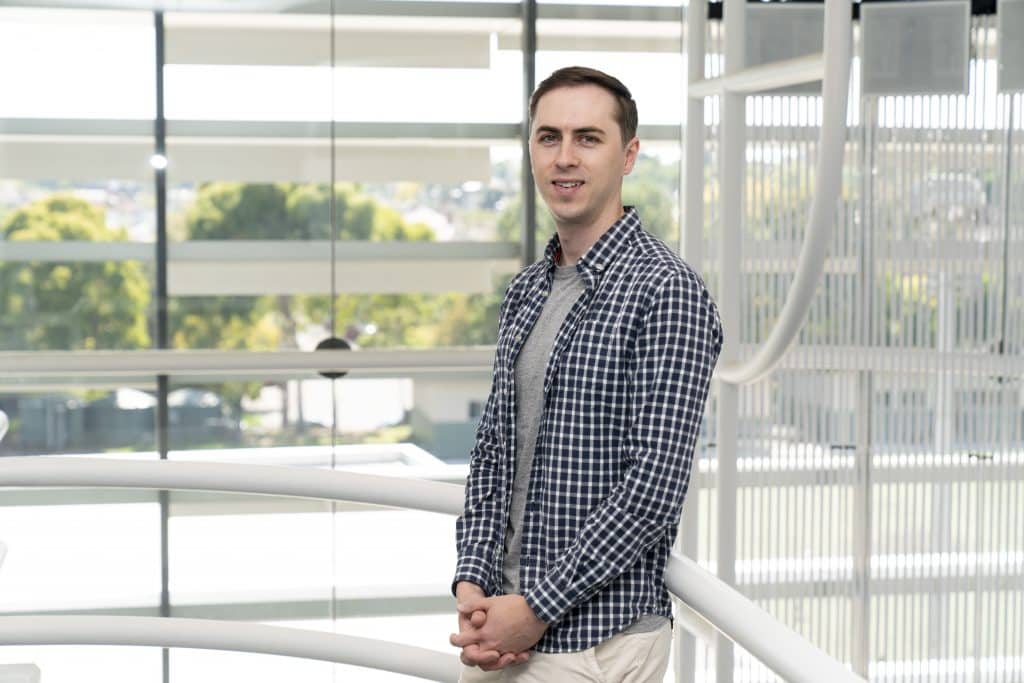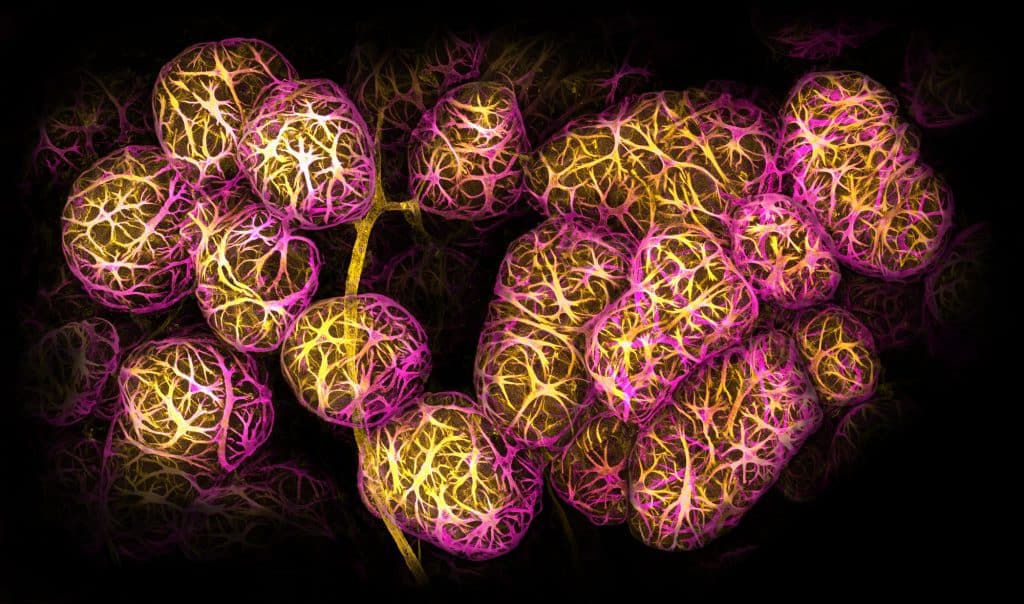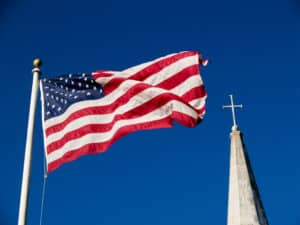
David Hooker
23 July 2022
This is the first in a new series of articles exploring the science-faith journeys of younger Christian scientists. Our hope is for these interviews to encourage those who may be thinking about integrating a science career with their Christian faith. Here, ISCAST Publications Director Dr David Hooker interviews Dr Caleb Dawson, a post-doctoral researcher at the Walter and Eliza Hall Institute for Medical Research in Parkville.
David: Caleb, as we get started could you tell us a little bit about yourself?
Caleb: Yes, I’m 30 years old and born in Melbourne. I attend a church with my wife in Bundoora. Apart from science, I like music! I like to play guitar. We like to cook as well and eat our way around Melbourne. I’m working at the Walter and Eliza Hall Institute, known as WEHI, which works on a range of diseases – cancer, infectious disease and developmental diseases.
David: How and when did you first get interested in science?
Caleb: I’ve always been interested in science actually. Even as a young child I was fascinated by the way things worked and the fine details of things. My uncle gave me a butterfly collecting kit when I was 12 or 13 and that had me running and catching butterflies and seeing all the beautiful patterns on the wings. A love for science and nature seemed a part of me really. So later I did a science degree at Melbourne Uni majoring in biochemistry, and during that time I got some experience in a lab – researching platelet production in mouse embryos – that got me keen on medical research.
I knew of a team that was using really brilliant microscopy to make beautiful 3D multi-coloured images of cells and tissues. I thought that was impressive! So I did my PhD in breast cancer in that lab and learnt these imaging techniques. During that time I made a really surprising discovery of a new type of immune cell in breast tissue. That sent me off on a new tangent in immunology (the study of the body’s immune cells) and cancer research using amazing microscopy techniques.

David: Ok, you’ve had several years to get a feel for medical research as a scientist. What have been a couple of the most challenging chapters in your science career, and what led to those challenges?
Caleb: I think the first most challenging time was in the later stages of my PhD. It was the expectations, both from supervisors and from myself. In thinking day and night about experiments I neglected other parts of life, more important things like spending time with God and family, and reading God’s Word. So I do wish I had more balance there, in hindsight.
Now I have a different type of challenge as a postdoc. It’s about making sense of career direction, balancing experiments, grant writing, publication, and work-life balance.
Read more: Are we slaves to our genes?
David: We’re also here to chat about doing science as a Christian, so let’s get more into the faith side of things now. How did you become a Christian?
Caleb: I grew up in a Christian family so I always knew about God and the gospel. But especially as a teenager in high school I was filled with doubts. I really wanted to be sure of absolutely everything, to have figured out all the controversies before I committed my life to God.
Then after uni, I came to the realization that God is far beyond anything that I can really understand and that the questions I can battle against are endless! I had to accept that I wouldn’t be able to answer all of these things.
Eventually I said to myself, “Okay I don’t need to figure everything out right now, but I know God is good and that he loves me”. So from that point on I just trusted him. Now, sure I’ve been pondering these science-faith questions constantly but not as front and centre, more as background thoughts. Now it’s about entrusting my life to God. Through that God has been growing me, revealing sin, steadily working in my life. Looking back, I can see the great blessings that he’s given to me.
Read more: The accountant with a heart for holistic care
David: As committed Christian scientists we know that living out our faith in the workplace can be difficult. What’s your experience in this regard?
Caleb: It’s a challenge just to keep God at the centre. In science in particular, the research questions become a personal battle to find solutions: this constant pre-occupation can push God’s centrality aside.
Also, being a logical-minded person doesn’t lend itself well to a relationship with God because I don’t think God really wants us to reason with him and to argue with him, he just wants us to know him, to be open and vulnerable to him.
I’ve thought a lot about how my faith should operate with work colleagues. I do find it hard to talk to colleagues, it often feels like my faith isn’t very present in my work. If no one can see my faith plainly, then it’s hard for God to get the glory.
I ended up making a website where I share a little bit about my thoughts, my faith journey and my research. That was really just a hobby for a while, but God has been working through that and encouraging many people, for which I’m very grateful to God.
I’ve had a few [faith conversations with colleagues]. I found that most people I’ve talked to are accepting – not of my faith for themselves, but in a way that says, “Oh that’s good for you, happy for you, but it’s not for me”.
One person struggled with reconciling God and suffering, and reconciling science with the Genesis accounts. But it seemed as if there was always going to be another question, similar to how I was earlier on. In the end, we really have to open our hearts to God, and God has to work in our hearts too.
David: I’m sure people will be thinking about what you have said to them, and seeds are being sown. To move to another topic: How has science shaped your Christian faith? Could you give us an example?
Caleb: The science is one place I go to where I see God. In microscopy I see really amazing and beautiful structures in the body, and it does make me so impressed by God’s creation, how complex it is and how beautiful. The fact that any of it is possible is mind-blowing and we know so little about how it all works, we only chip away very slowly.
Read more: Myths vital to understanding climate change
David: As a fellow biologist, I second those thoughts of awe and wonder! A few questions to close, and one of them is: Where would you like to be going in your science faith journey?
Caleb: It’s an interesting question to think about. Firstly, in my faith I just want to grow stronger in discipline and reading God’s Word and in prayer throughout all parts of my life. Whether science or life generally, that’s where it starts. I’d like also to read more widely other people’s views. And, to have conversations with non-Christians at work, and those who are struggling with faith and science, encouraging them. And doing my research in a way that honours God, with quality and integrity.
David: In closing, is there any advice and encouragement you’d like to give Christian readers, some of whom may aspire to be a scientist?
Caleb: I think the main thing is to have faith in God and to trust Him first and to put everything else in its right priority. All of the debates and the tough questions – the goal is not to put too much importance on them because they’re not central to our life with God. They’re really interesting and important questions but there are many things that we will never know for certain because God hasn’t revealed them to us. God is far beyond what we can ever know so treat them as interesting questions and don’t let them get in the way of knowing God and living for him.
David: Great advice. Thank you, Caleb! I really appreciate your openness, honesty and the helpfulness that your comments have for our readers.
For more faith news, follow The Melbourne Anglican on Facebook, Twitter, or subscribe to our weekly emails.







